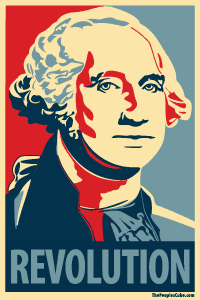By Fred Hutchison | April 26, 2012 | Renew America
 Originally published June 26, 2004
Originally published June 26, 2004
Certain aspects of the culture war have ancient roots. One of the central points of disagreement regards the existence of a universal moral law. Political philosophers have been arguing about this for three hundred years. The ideas at stake are ancient.
First, I shall point out some of the ancient and early modern roots of the old argument. Subsequently, I shall discuss the rise of the American consensus. Then I shall consider how the debate has changed and the wells of reason have been poisoned as we moved out of the Modern era and into the Postmodern era.
Pantheism and the universal moral law
Twice in Western history, Pantheism (the belief that everything is god) became popular. The first version of Western Pantheism was the philosophy/religion of Stoicism, which arose in the Hellenistic cosmopolitan Greek world that followed the conquests of Alexander. The Stoics claimed that everything — matter, mind, and nature — was precipitated out of the divine fire. This is a distinctive version of Pantheism. Stoics rejected the old Greek city-state parochialism and regarded themselves as part of the cosmos, part of humanity, and part of the metropolitan city.
During the time of the Roman Empire, the cities became larger and more metropolitan, the Mediterranean culture became more universal, and the appeal of Stoicism spread. The Apostle Paul found the Stoics debating the Epicureans at Mars Hill. Stoicism became popular among the Roman aristocracy in the second century. The “five good emperors” (Trajan, Hadrian, the two Antonines, and Marcus Aurelius) lived during the time of the Stoic Roman aristocrats — who were always talking about virtue and about “logos” or “right reason.” The Stoic concept of logos had an influence on Roman law. Emperor Marcus Aurelius was a Stoic philosopher in his own right, and his writings are still considered Western classics.
The Stoics developed the concept of a universal moral law. They were influenced by Aristotle’s teaching about natural law (fourth century BC). They may have been indirectly influenced by Christianity. St. Augustine (5th century AD) wrote about natural law, and Gratian (11th century) equated natural law with divine law. The medieval scholastic St. Thomas Aquinas (13th century) systematized the “eternal law of divine reason,” in a complex formulation which has been heavily borrowed from since that time by natural law theologians, philosophers, and political theorists.
Notice that during the middle ages, the universal moral law was broken free from its old pantheistic associations and firmly associated with Christianity. It was a good fit.
When Pantheism rose again to favor in the eighteenth century, it contained ideas antithetical to the universal moral law. The rejection by some influential pantheists of the universal moral law resulted in a clash of world views. This marked the beginning of a hostility to Christianity by intellectuals influenced by pantheistic ideals. One of the early signs of this clash came during a debate by leading philosophers over the metaphysical implications of the 1750 Lisbon earthquake. Many of the French “encyclopedists” were also hostile to Christianity, but they were a motley crew — some atheists, some empiricists, some deists, and some pantheists.
A major stream of Western Pantheism in the eighteenth and nineteenth century involved a Romantic worship of nature. Under the influence of Rousseau, some Romantics rejected the universal moral law and replaced it with “the general will” and “democratic values.” To this day, we can hear liberals and conservatives talk past each other as the liberals speak of an ethics based upon “democratic values” and “social justice,” and conservatives speak of an ethics based upon the moral law.
 During the eighteenth century, natural law philosophy was popular among some of the deists and favored by some leading philosophers like Locke, Hobbes, Montesquieu, and Kant. This stream of thought influenced the American founding Fathers. All these philosophers except Kant built their foundation upon nature in order to develop ideas of natural law. Man has a nature. Therefore, there must be a natural law and a moral law suitable to man to govern human conduct. Reason can discover this moral law. Some natural law philosophers such as Locke and Kant had ideas that were not far on some points from the universal moral law of Christian theology and of Stoicism. The similarities were especially noticeable on issues which had political and legal implications.
During the eighteenth century, natural law philosophy was popular among some of the deists and favored by some leading philosophers like Locke, Hobbes, Montesquieu, and Kant. This stream of thought influenced the American founding Fathers. All these philosophers except Kant built their foundation upon nature in order to develop ideas of natural law. Man has a nature. Therefore, there must be a natural law and a moral law suitable to man to govern human conduct. Reason can discover this moral law. Some natural law philosophers such as Locke and Kant had ideas that were not far on some points from the universal moral law of Christian theology and of Stoicism. The similarities were especially noticeable on issues which had political and legal implications.
Natural law — a hybrid concept built upon both philosophical and theological foundations — was crucial to the American founding fathers. In contrast, Romantic ideas about the general will, democratic values, and social justice were essential to some of the factions involved in the French revolution and to some of the liberal democracies established in Europe.
We must not place all the blame on Rousseau or on Romantic Pantheism for the rejection of the moral law. Beginning with the Pauline Epistles, the church has been continually fighting against the heresy of antinomianism, which means “against law.” The antinomians thought that those who are in a state of grace could violate the moral law with impunity. All the great theologians weighed in on the subject, including those of the Reformation and those who fought the challenge of theological liberalism in the nineteenth and the twentieth century.
The Scottish Enlightenment — and America
Many key thinkers in the French Enlightenment were anticlerical and some were anti-Christian. The Scottish Enlightenment was not. Francis Hutcheson, who was both a Presbyterian pastor and a professor of philosophy, is hailed by some as the Father of the Scottish Enlightenment. Hutcheson emphasized the moral aspect of Christianity. He taught 1) natural law philosophy based upon the study of man in a state of nature, 2) the Greek Classics, and 3) Christian theology — and emphasized the areas of harmony of these three.
(To indulge the reader’s curiosity, Hutcheson probably comes from of the same Scottish clan which I do as a Hutchison, and there is a remote possibility of a distant blood relationship.)
Among the many influential voices of the Scottish Enlightenment, the ones most familiar to us are Adam Smith, David Hume, James Boswell, Thomas Reid, James Watt, and Edward Gibbon. Gibbon was an Englishman but intellectually was a product of the Scottish Enlightenment.
The most skeptical voice of the Scottish enlightenment was philosopher David Hume. But Hume developed his own version of a moral law and he did not view Christianity as an enemy of the Enlightenment.
Both the French Enlightenment and the Scottish Enlightenment had an influence on the American founding fathers. But even Jefferson and Franklin, the founders who were most charmed by things French, sometimes spoke in a voice that sounded more like the Scottish Enlightenment than the French. There was heavy immigration by poor but remarkably well-educated Ulster Scots and the Scots from lowland and border precincts of Scotland during the period 1745–1800. This introduced a bias for the Scottish Enlightenment in the American colonies and the early Republic. As a result, Francis Hutcheson’s vision of Christian morality in alliance with natural law theory and the classical virtues became the working mainstream reality of American politics.
Read the full article here.
Related Articles
- of pantheism (fffmks.wordpress.com)
- How Free Is The Will? | Russell Blackford | ABC | 27 April 2012 (abc.net.au)
- Religion and the Vampire, Interview Four (thegraveyardpress.wordpress.com)
- The Best of Fred Hutchison: Postmodern Barbarians (johnmalcolm.me)
- Guest Post: Mattheus von Guttenberg on an Exploration of the Validity and Necessary Content of Transcendental Argumentation (philosophyandpolity.com)
- Our complex, difficult & fragile enlightenments (3ammagazine.com)
- Naturalistic Pantheism and Inspiring Diction (wanderlustmind.com)
- A Simple Conversation (unsettlingthoughtsformylife.wordpress.com)
- Adam Smith: An Enlightened Life (manwithoutqualities.com)
- Characteristics of the Virtuous? (stoiclawyer.wordpress.com)
 Originally published June 17, 2004
Originally published June 17, 2004 Kenneth Clark made short work of the Romantic nostalgia for barbarism. “People tell me that they prefer barbarism to civilization. I doubt if they have given it a long enough trial….they are bored with civilization; but all the evidence suggests that the boredom of barbarism is infinitely greater. Quite apart from discomforts and privations, there was no escape from it. Very restricted company, no books, no light after dark, no hope. On one side the sea battering away, on the other infinite expanses of bog and forest. A most melancholy existence!” (Civilization, by Kenneth Clarke)
Kenneth Clark made short work of the Romantic nostalgia for barbarism. “People tell me that they prefer barbarism to civilization. I doubt if they have given it a long enough trial….they are bored with civilization; but all the evidence suggests that the boredom of barbarism is infinitely greater. Quite apart from discomforts and privations, there was no escape from it. Very restricted company, no books, no light after dark, no hope. On one side the sea battering away, on the other infinite expanses of bog and forest. A most melancholy existence!” (Civilization, by Kenneth Clarke)






